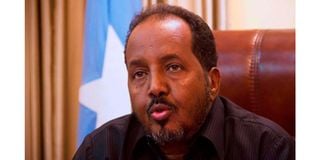Premium
Clashes reported in Mogadishu over tense election fiasco

Former Somalia president Hassan Sheikh Mohamud.
Authorities in Mogadishu have remained mum even as opposition leaders claimed government forces were unleashed on them on Sunday afternoon.
Former president Hassan Sheikh Mohamud claimed he had been attacked by “Farmaajo’s army”, just hours after Somali media outlets reported that ‘mutineers’ in the Somali National Army had taken control of various roads in the capital as they battled government forces and intelligence agents.
“It is very unfortunate that an army under the command of the former president [Farmaajo] attacked my residence,” Mohamud, President between 2012 and 2017 said on Twitter, referring to President Mohamed Farmaajo who opposition groups say his term ended on February 8.
“I have already warned and reiterated the dangers of politicising security. Farmaajo is responsible for the consequences.”
Government installations
The claim was not immediately rebutted by government officials. But Col Abdulkadir Abdullahi, a Spokesman for the Somali National Army refuted claims some soldiers had decamped. He, nonetheless, told local media that his forces will continue guarding important government installations.
Other opposition leaders, however, repeated the accusation that President Mohamed Farmaajo had politicised the military.
“I condemn the attack carried out by Farmaajo's forces on the residence of former President Hassan Sheikh Mohamud,” added Abdulrahman Abdishakur, a former Planning minister who is now allied to Mr Mohamud in the opposition group known as the National Salvation Forum.
“I call on the residents of Mogadishu to defend President Hassan. We warn the ammunition taken this afternoon from Amisom by Fahad Yasin (head of intelligence agency, NISA) is being used to fan conflict.”
The accusations, nonetheless, punctuated a tense week in Mogadishu as parties squabbled over President Farmaajo’s extension of term.
Indirect election
On April 13, the Lower House of Parliament extended their term and that of President Farmaajo by “not more than two years” according to a motion passed then.
But this move has been opposed by local rivals who argue it is an illegal extension. The African Union, the UN, European Union and other donors have since disagreed too, arguing the leaders should negotiate timelines for an indirect election based on an agreement reached last year in September.
On Sunday, reports emerged that some militia groups composed of disgruntled soldiers had allied with sacked Mogadishu police chief Sadiq John. Mr Sadiq was fired after he ordered troops to block a session of Parliament that led to the controversial extension.
“[I am] highly concerned about the ongoing events in Mogadishu,” said Nicolas Berlanga, EU Ambassador to Somalia:
“The general interest requests maximum restraint, preserve institutions that belong to all and dialogue. Violence is unacceptable. Those responsible will be held accountable.”
The events in Mogadishu came just hours after Somalia’s Humanitarian and Disaster Management Minister Khadija Diriye declared a national drought, saying 80 percent of Somalia was affected following erratic rains.
According to the UN, the drought in the country has been “worsened by political instability, armed conflict and forced displacement.”
Tough week
“We are at the brink of a human catastrophe, amidst an already dire humanitarian situation,” said Adam Adelmoula, Humanitarian Coordinator for Somalia.
President Farmaajo has faced a tough week that saw both the UN Security Council and the African Union Peace and Security Council decline his two-year extension and urged him to resume negotiations with Federal States on the next indirect elections, which the AU sees as “viable” given the country’s security and financial situation.
But President Farmaajo has fought back, targeting neighbours Kenya and Djibouti of arm-twisting AU Council members to issue a tough stance.
“FGS [Federal Government of Somalia] shall not accept any decision on its sovereignty to be made by bodies led by parties with pre-existing disputes with Somalia…,” said Abdirashid Hashi, Farmaajo’s spokesman, on Friday, accusing Kenya and Djibouti of “unsuccessfully” pushing for unspecified sanctions.
The report of the 993rd meeting of the AU Council, however, listed a legal framework under which the decision to reject the Parliamentary motion was based as a possible “unconstitutional” extension.





